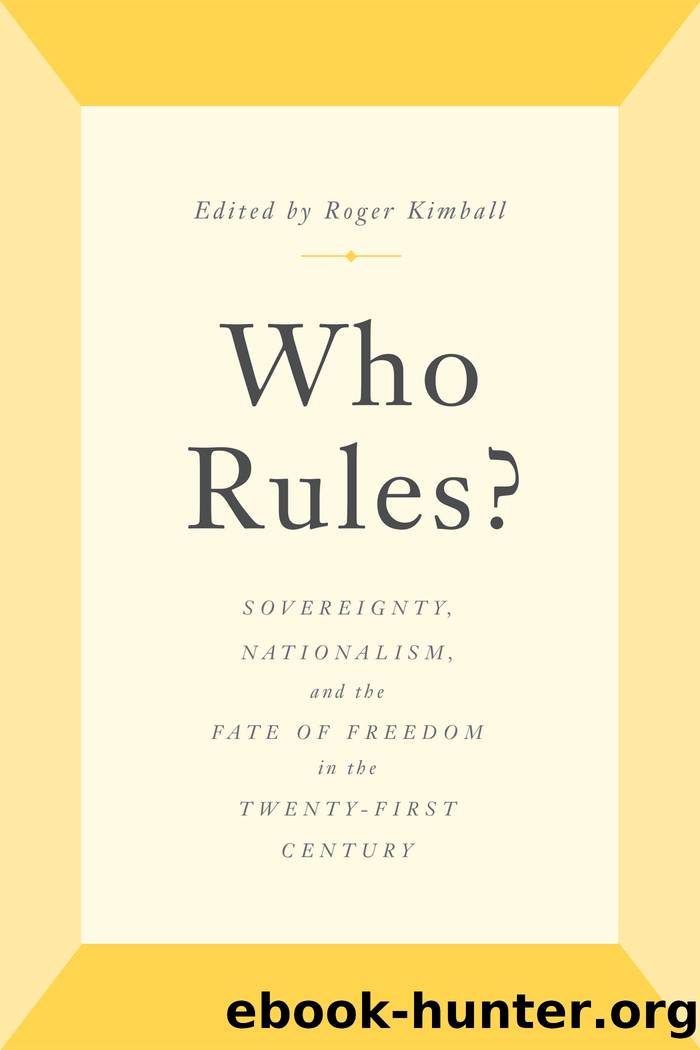Who Rules? by Unknown

Author:Unknown
Language: eng
Format: epub
Publisher: Encounter Books
Published: 2020-11-15T00:00:00+00:00
Liberty: Collective & Individual
ANGELO M. CODEVILLA
MY PURPOSE here is to examine the philosophical and practical bases for the American peopleâs rejection of the past centuryâs peculiar âinternationalism,â and to suggest that the best way of transcending it, and hence to resume control of ourselves as well as of our relationship with other peoples, is to return to the principles set forth in the Declaration of Independence and practiced by presidents from George Washington to Theodore Roosevelt.
Our Declaration of Independence states as a self-evident truth that: âThe laws of Nature and Natureâs Godâ entitle âone peopleââany and all peoplesâto a âseparate and equal stationâ âamong the powers of the earth.â Because all men are naturally free to distinguish themselves collectively among âthe powers of the earth,â therefore each people, being sovereign over itself, may exercise its natural liberty to rule itself, and only itself.
Biblical revelation of equal creationââand God created man in His own image, male and female created He themââis also the source the Declarationâs other âself-evident truthâ: âall men are created equal ⦠endowed by their Creator with certain unalienable Rights â¦â This truth is self-evident to those who believe that God creates all human beings, and that this Divine image is single, ineffable. Natural reason supports this truth. Consequent to it, because each and every human being is naturally sovereign over his own âlife, liberty, and the pursuit of happiness,â no one may rightly rule another without his consent.
The collective right of peoples to have lives of their own and to pursue happiness as they see fit, is simply the writ-large version the equal rights of individuals that proceeds from their equal creation.
Though individual liberty implies collective liberty, the exercise of collective liberty does not necessarily imply the enjoyment of natural human rights, never mind the exercise of civil liberties. These liberties happened to coincide in America, albeit imperfectly, because of a heretofore happy coincidence of a certain sense of nationhood with a certain understanding and dedication to righteous living.
As far as Americaâs Founders were concerned, the whole point of government is to preserve the happy coincidence that made America unique. John Quincy Adams explained the Foundersâ America:
the people ⦠were associated bodies of civilized men and christians, in a state of nature, but not of anarchy. They were bound by the laws of God, which they all, and by the laws of the gospel, which they nearly all, acknowledged as the rules of their conduct. They were bound by the principles which they themselves had proclaimed in the declaration ⦠by all the beneficent laws and institutions, which their forefathers had brought with them from their mother country, by habits of hardy industry, by frugal and hospitable manners, by the general sentiments of social equality, by pure and virtuous morals.
The people, he said, were to cultivate and show forth a character, commitment, and cohesion peculiar and separate from that of other nations:
It is a common government that constitutes our country. But in THAT association, all the sympathies
Download
This site does not store any files on its server. We only index and link to content provided by other sites. Please contact the content providers to delete copyright contents if any and email us, we'll remove relevant links or contents immediately.
The Ten Equations That Rule the World by David Sumpter(733)
Improvise! by Max Dickins(701)
The Art of Fairness by David Bodanis(683)
A Leader Listens by Ajay Banga(670)
Dean Graziosi-Millionaire Success Habits-Dean Graziosi (2016) by Unknown Author(667)
The F.I.R.E. Planner by Michael Quan(579)
Perfecting Your Pitch by Ronald M. Shapiro(556)
Big Boys' Rules by Mark Urban(551)
Meetings With Remarkable Men by G.I. Gurdjieff(542)
Good Boss, Bad Boss by Robert I. Sutton(525)
The Power of 3 by Robb Hiller(525)
Napoleon Hill's Golden Rules by Napoleon Hill(517)
Crush Your Career by Dee Ann Turner(514)
Direct Selling by unknow(489)
Master the Game of Money by Robbin Kelly(478)
The Three Signs of a Miserable Job by Patrick M. Lencioni(464)
Napoleon Hill's Keys to Success by Napoleon Hill(458)
The 4 Laws of Financial Prosperity: Get Control of Your Money Now! by Blaine Harris & Charles Coonradt(435)
Train (Your Brain) Like an Olympian: Gold Medal Techniques to Unleash Your Potential at Work by Jean François Ménard & Marie Malchelosse(425)
